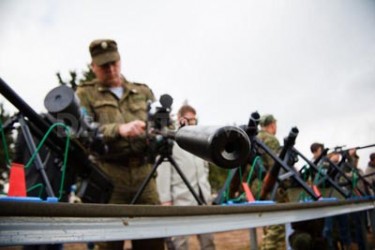
In June and July Russia held several military exercises with its regional partners. There are more to come in August and September. Of course, none of the planned events are quite as extensive as the one that an Iranian news agency falsely reported on June 19th, in a bit of wishful thinking. There won’t be joint war games involving 90,000 troops held in Syria by Russia, China and Iran.
Even then, the exercises are numerous and heavily concentrated in Central Asia. In June there was Peaceful Mission-2012 [ru], held by five Shanghai Group countries (Russia, China, Kazakhstan, Kyrgyzstan, and Tajikistan) in Tajikistan. There were 2000 troops involved in the antiterrorist themed war game, of which Russia contributed 350.
In July, Russia held Aldaspan-2012 [ru], this time bilaterally with Kazakhstan. Then, in early August there was the Frontier-2012 [ru] exercise involving members of the Collective Security Treaty Organization (CSTO). [Uzbekistan withdrew from the CSTO on June 28th after it refused to allow Kazakh troops transit to Tajikistan for the Peaceful Mission-2012 war games.]
So far the only non-Central Asian exercise was Slavic Fellowship-2012 [ru], involving Russia, Belarus, and Ukraine. It went by relatively unnoticed in July. In general, none of these exercises have generated much buzz on RuNet, and some of the ones still to come – Selenga-2012 [ru] with Mongolia or Cooperation-2012 [ru] with CSTO, both scheduled for September – are also unlikely to become major news items.
This may not be the case with for this September’s Caucasus-2012 [ru], which Russia is planning to hold with forces from the breakaway Georgian provinces of Abkhazia and South Ossetia. Caucasus-2012 will take place in North Caucasus region and will involve [ru] 8,000 troops, as well as heavy machinery, artillery, navy, and air force. This makes it Russia’s largest exercise this year.
Caucasus-2012 is only nominally international in scope, since Abkhazia and South Ossetia’s independence isn’t recognized by many countries. The Russian military is quick to reassure [ru] that bases south of the border will not be involved, even though some forces from those bases will participate in the exercises. However, it is still too close to comfort for the Georgians, who are wary [ru] of an August 2008 scenario. Four years ago, Russia also held war games in the Caucasus prior to the invasion of Georgia.
Some Georgian bloggers, like popular Russian-speaking cyxymu [ru], note that Russia’s mobilization in the region comes right before Georgia’s parliamentary elections on October 1st. Moreover, zabugina [ru] believes that the goal of Russia’s military is to destabilize the region and sway the elections. She thinks that Russia would not have to invade again, in order to exert its influence and manipulate the Georgian public to vote for Russia-friendly parties. Nevertheless, Russian journalist and blogger podrabinek [ru], thinks that Putin might actually launch a small border war as a way to boost his popularity.
However, not all of Russia’s military exercises are generating as much concern as Caucasus 2012. Currently, Russia and India are in the middle of joint exercise Indra-2012 [ru] in the Russian Republic of Buryatia, on the Mongolian border. One Russian blogger recounts [ru] a humorous story of how people reacted in a bus when a radio announcer misspoke and said that 500,000, rather than 500, Indian troops would be involved in the exercise:
“At this point the bus becomes silent – a stomach chilling sort of silence. A deathly silence.”
For further information on the topic, please view the following publications from our partners:
Georgia-Russia: Learn to Live Like Neighbours, from International Crisis Group, Brussels, Belgium.
Getting Cold in the Caucasus: Can the EU Prevent the Freezing of the Georgian-Russian Conflict?, from the Finnish Institute of International Affairs (FIIA), Helsinki, Finland.
Addressing the Security Challenges in the South Caucasus: The Case for a Comprehensive, Multilateral and Inclusive Approach, from the European Policy Centre (EPC), Brussels, Belgium.
For more information on issues and events that shape our world please visit the ISN’s Security Watch and Editorial Plan Dossiers.


One reply on “Russia’s War Games Make Georgia Nervous”
Lie in the article. Georgia in August 2008. attacked peaceful Ossetians living in South Ossetia. Russia saved the people of Ossetia from genocide and destruction.